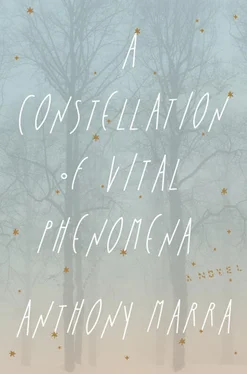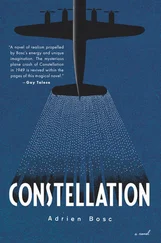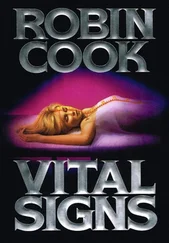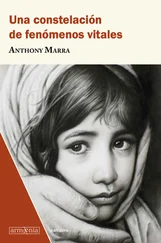“There are more words.” The firelight twitched across their faces. It was all he could say.
“There are more writers.”
“You can’t do this.” He spoke from a fear that closed his stomach into a fist, helpless like a child, his emotions a magnification of what he detected in the elder. If Khassan lost hope, where would Akhmed find it?
“You wouldn’t understand, Akhmed, but you might, if you reach my age. I was thinking of the stories my mother used to tell me about princes and warriors who went to great measures to ensure their names would endure, and were punished by Allah for their pride. I want to be forgotten. There is something miraculous in the way the years wash away your evidence, first you, then your friends and family, then the descendants who remember your face, until you aren’t even a memory, you’re only carbon, no greater than your atoms, and time will divide them as well.”
“What are you saying?” Akhmed asked, though he didn’t want Khassan to say any more.
“I’m saying that I want to disappear.”
Once, while hunting in these woods, Akhmed came upon a doe flopping on the ground and struggling to breathe. A distended pink wound spread her hind legs, and her snout held a long line of anguished groans, and to end her suffering he aimed for her neck. But before he pulled the trigger, the sac-wrapped end of a fawn split open the wound. His jaw slackened. He set the rifle among the leaves, hid his forefinger behind his back, ashamed of what it had nearly caused, and watched one life begin where another had nearly ended. And now, with the final sheets curling on the coals, fear rose to wonder as he witnessed a moment of equal profundity. Not once for as far back as he could recall had Khassan ever admitted to a shortcoming, a mistake, not even a lapse as trivial as a missing comma. Tonight he confessed total failure.
The returning headlights stretched their shadows across the clearing too soon to have gone all the way to the hospital. As the beam of light swung toward them, he saw, briefly, paw prints in the ashes of fifteen million words.
Held aloft by distant tacks of starlight, the night was a blackout curtain concealing Ramzan’s truck until it was too late for Akhmed to turn back. Ramzan climbed from the cabin, lit a cigarette, and stared at what had been Dokka’s house as Akhmed approached.
“Have you seen my father?” His face dipped into the orange orb with each inhalation. If he had the flat face of an ogre, or the many heads of a hydra, Akhmed might understand. If he had the cleft tongue of a devil, or the snake-hair of a Medusa, or the matted hair of a wolf-monster, Akhmed might understand. But Ramzan had two eyes, a nose, and a mouth, pairs of arms and legs and ears, hair greasy but not slimy and certainly not slithering, and Akhmed did not understand. They had been born in the same village, had gone to the same school, had their knuckles purpled by the same meter stick, kicked the same soccer ball down the same dirt patch where in summer the grass grew thick enough to block a penalty kick.
“What do you really want?” Akhmed asked, too tired to be intimidated.
Ramzan frowned, his cheeks the white of pounded metal. “Just to talk,” he said. “It’s been a long time since I’ve spoken to anyone. Two weeks. I keep a notebook and sometimes I write things down, and you can fake a conversation that way, for a little while, but—”
“I don’t want to talk to you,” Akhmed interrupted.
“The last person I talked to was Dokka. Two weeks ago. I came by to ask if he wanted more firewood. And now look what happened. Our poor friend. What did he get himself into?”
“Nothing. He couldn’t kill a loaf of bread with a butter knife.”
“And I’m told the girl, Havaa, even she was disappeared. But not by the security forces, praise Allah. No, she was taken by someone else. Someone else took her, but I don’t know who. I think I have my finger near him. Or her. He could be a she. But I think he is a he. A him. A—”
“Where was she?” Akhmed asked, as calmly as he could manage.
“The security forces didn’t find her. She wasn’t there. She wasn’t anywhere.” Ramzan paused only to breathe. “Not in the living room or bedrooms or under the floorboards or in the closets, nowhere, nowhere, nowhere.”
“Why do they even care?” he asked, hoping Ramzan, who sold information, might give a small piece for free. “What could they possibly want with a child?”
“No one is off limits because there are no limits. The why and what aren’t for us to consider. Those are questions for philosophers and imams and not for people like us, whoever we are.” His lips glowed in amber light. “The who and the where are all we must know and all we must answer.”
“I don’t see the why and what of a child.”
“There you go, Akhmed. Asking the wrong question. She’s wanted. That’s it. It doesn’t matter why. All that matters is where she is and with whom.”
“If I see her I’ll tell her you’d like a word.”
“You’re being smug, smug, smug.” Ramzan’s lanky arm wrapped around Akhmed’s shoulder and the sweet, decadent scent of deodorant wafted from his underarm. The first time Akhmed became fully aware of his own odor had been on his wedding night, when, pressed against her in bed, awkward and struggling and generally doing it all wrong, he noticed Ula tilt her head to the open window.
“Dokka is gone,” Ramzan said, close enough for his breath to warm Akhmed’s neck. “He’s gone. It makes me sad. He’s gone. I wish he were here so I could ask him what to do. So I could say hello. I could talk to him. He always listened to me. He always spoke with me. He always answered when I asked a question.”
All too aware of that, Akhmed said nothing. It hadn’t always been like this. For years he, Ramzan, and Dokka had been friends. Every other Sunday they had gathered at Dokka’s house to play chess, feast lavishly, and for just a few hours overthrow the fear and deprivation that had replaced the old order. In another life Ramzan’s weaknesses would have manifested no tragedy greater than a cheated chess victory. Ramzan was the youngest of the three, so poor a chess player that Dokka had given him private lessons. He had learned well: made a board of the village, a pawn of the master.
“So tell me, where have you been all day?” Ramzan asked, his voice flat and solid, the voice of the anvil rather than of the metal flattened to it. “Tell me where you’ve been, who you’ve seen.”
“Nowhere, no one.”
“Come on, Akhmed. We both know that you will tell me. You are a clever man, you have a sick wife to consider, you know what will happen if you don’t. Let’s try it again. Akhmed, my dear friend, where were you today?”
Akhmed said nothing.
“Shy today, aren’t we? Well, let’s start small. Tell me something you’ve done today, hmm?”
“Praying.”
“That’s good. You should pray. I pray ten times a day. Five times for me and five for my father. I’m taking care of him, don’t worry about that,” Ramzan said. His lips were banks unable to seal the stream gushing between them. “Prayer is important. Prayer is very important. Especially now that we are living in the end time. You know that, don’t you? The final Caliph will appear and the prophet Jesus will descend and he will slaughter the pigs and break the crosses. We don’t have much time left, I don’t think. That’s why I pray ten times a day. I should probably pray fifteen or twenty times. My father needs it. You believe in the last days, don’t you?”
“I believe in final judgments,” Akhmed replied. “I believe we will each be called to account for our lives.”
Читать дальше











